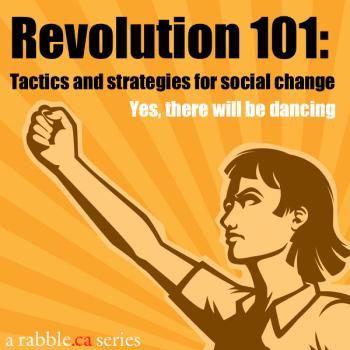Idle no more opened an exciting new chapter in Indigenous organizing, but as Krystalline Kraus said in her piece on indigenous protest: “Indigenous communities across Turtle Island have not been idle — they have been resisting colonialism since the first European boats washed up all desperate and hungry on North and South American shores.”
This perception of Idle No More is all too often a result of “allies” failing to educate themselves. Understanding the long and important history of indigenous resistance is a good place to start unlearning for settlers. The legacy of Turtle Island’s colonial history is inescapable, from generational violence that started at first contact to centuries old legislation that still holds power over Indigenous peoples’ daily lives.
But knowledge alone isn’t enough. Settlers need to be active without piggybacking on direct actions, looking for token Indigenous involvement or laying claim to struggles that aren’t their own. Instead, settlers can be effective allies by decolonizing their own organizing frameworks. Here are a few quick tools to introduce non-Indigenous activists to allyship.
History
Chelsea Vowel (âpihtawikosisân) has compiled a generous series of primers on basic Indigenous issues 101. From identity and culture to aboriginal laws and treaties to historical and continuing injustices, these primers cover a lot of ground and act as a solid introduction for folks completely unfamiliar with basic Indigenous topics. For more specific topics, look into a Short History Primer on Six Nations on babble, a Settler’s Guide to the First Nations Education Act and a treaty primer for non-natives. The Activist Toolkit has brief historical overviews on The Two Row Wampum, the White Paper, and the Indian Act. Idle No More also has an interactive timeline of its living history on their website.
Decolonizing organizing
When allies start organizing, the difference between de-colonized allies and colonized allies is clear. Moving beyond solidarity, decolonizing means actively unlearning and re-imagining relationships. Decolonizing is a life-long process. The zine Everyone Calls Themselves an Ally Until It’s Time To Do Some Real Ally Shit by Ancestral Pride is a good resource to start with to find some basic tips for using settler privilege to support Indigenous struggles. Unsettling America has compiled many different resources on how to be a meaningful ally to indigenous people including guidelines, responsibilities and critical analysis of the ally industrial complex. The Native Women’s Association of Canada has a toolkit on missing and murdered Indigenous women that provides ideas for allies and community members alike.
Find more tools for being an effective decolonized ally here.
Workshops
The onus to educate settlers about colonization should not rest with the Indigenous folks facing oppression from it every day. Settlers must take the time, as true decolonized allies, to educate others. This guide to facilitation might be helpful in figuring how to manage a success workshop. In the 500 years of Indigenous Resistance Zine there are workshop outlines along with more resources on the legacy of colonialism. Access to Media Education also has an accessible plain language workshop on colonialism. This booklet on decolonizing pedagogies can be extended to workshop strategies.
These tools are by no means exhaustive. This roundup is intended as a starting point for further discussion. Let us know what tools we missed, what you want to see on the Activist Toolkit and how you decolonize your activism in the comments.
Steff Pinch is a the coordinator of the Activist Toolkit.



